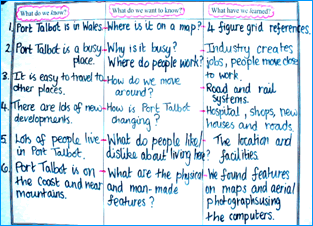Giving Direction to Geography
Areas for Development
- All schools would benefit from securing agreed transfer arrangements that included:
- the sharing of information on abilities and attainment at transfer
- allowing staff from partner schools to meet to observe each other's teaching
- discussing issues relating to continuity
- sharing good practice
- There is scope for teachers in each key stage to develop a shared understanding of how the pupils have been previously taught to facilitate a more coherent learning continuum.
- Within the secondary phase, the provision of an introductory regional unit would provide a geographical context for active and appropriate map skill development. It would also build on locality studies pupils are likely to have carried out at KS2, and assist staff in making a diagnostic assessment of what pupils know, understand and are able to do. It would also help ensure that pupils' commitment to learning is sustained and their progress enhanced.
- Schools would benefit from securing an enquiry-based approach to the subject, using the questions highlighted in the National Curriculum/LEA Scheme of Work as learning starting points. Pupils respond best when required to investigate and formulate their own responses. Requiring them to devise and carry out their own enquiry sequence would enhance progression, develop pupils' investigation skills, and further encourage independent learning. It would also allow for the application of geographical and key skills, especially ICT which is variable in its development at present.
- Primary schools almost invariably teach geography as a "stand alone" lesson during afternoon sessions, dedicating the morning sessions to core subject learning. While we appreciate the rationale for organising the school curriculum in such a way, it is felt that opportunities are often missed to use literacy and numeracy as vehicles for delivering the geography curriculum and vice versa.
- Whilst provision is made for graphical and numerical development, pupils in each key stage could progressively engage more frequently with geographical data and its representation in a variety of formats.
- Schools need to develop a subject portfolio that exemplifies a consistent approach to learning in geography across the school. The work included in the portfolio should be levelled and annotated, and shared across the key stages. Pupils' work should be used as a focus for discussions on progression and approaches to learning as pupils transfer.
- Arrangements to assess pupils' progress in geography within the primary phase are currently underdeveloped, and hamper colleagues in taking note of prior attainment to set appropriately challenging work. The use of ACCAC's optional assessment material is strongly recommended at KS2.
 A planning board used in a year 3 class as an initial stimulus and subsequently as a record of enquiry during a study of the pupils' locality.
A planning board used in a year 3 class as an initial stimulus and subsequently as a record of enquiry during a study of the pupils' locality.
| Back to Subject Reviews |

